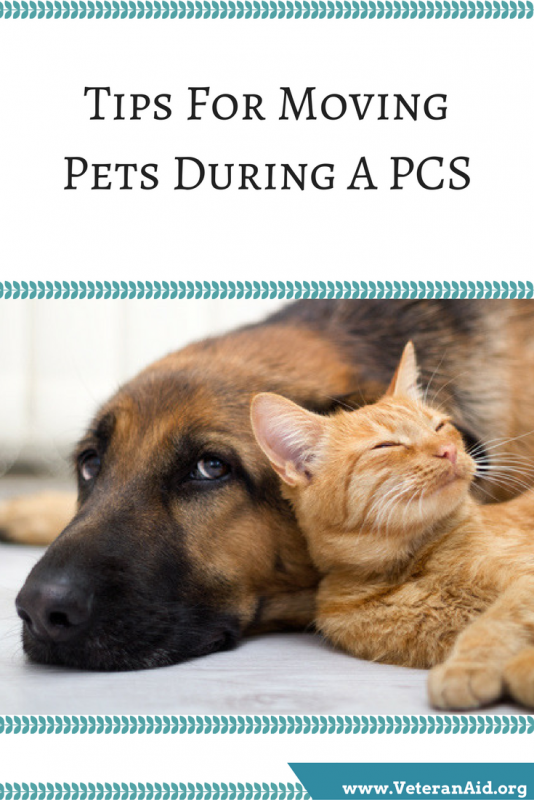Tips For Moving Pets During A PCS
Posted in Uncategorized on January 4, 2017
Tags: military spouses
Many military personnel and their families know the true value of a pet. Dogs and cats have been proven to help reduce stress and anxiety, add enjoyment to their owners’ lives, offer a sense of stability and loyalty, and even help reduce the symptoms of PTSD. Whether you are a single person or have several kids chasing your pet around the yard, that animal is undoubtedly a part of your family. When the military issues you your next permanent change of  station (PCS), that pet will be coming with you if at all possible. So how do you prepare so that an already stressful time – moving to a new state or even new country – is as easy as possible for your four-legged friend?
station (PCS), that pet will be coming with you if at all possible. So how do you prepare so that an already stressful time – moving to a new state or even new country – is as easy as possible for your four-legged friend?
Preparation and organization, as with many elements of a PCS move, are key. Even if your next PCS is years away, it’s a good idea to start keeping up-to-date on vaccines and records for your pet, so there’s no delay when you do receive your next orders. If your base has an onsite veterinarian, he or she would be a great place to start to ensure your pet is current with all required shots and records. Consider going ahead with a microchip or a spay/neuter procedure, as these are sometimes required for future posts. Keeping your pet regularly visiting its veterinarian can save you time and expense when you receive your next PCS order, as opposed to rushing to have multiple vaccines administered or several documents located.
When you move domestically, your pet must comply with the laws of your new municipality as well as your future base. Local restrictions and requirements can differ state to state, especially in the case of Hawaii, where there is a quarantine time similar to international travel. If you’re relocating internationally, your pet will most likely need an ISO-compliant microchip, proof of rabies vaccination, a health certificate, and an acclimation letter for flying, all of which you can get from your veterinarian. Your pet may also need a FAVN blood test, import form, flea/tick preventative, and dewormer as well. You can check the U.S. Department of Agriculture’s extensive list of guidelines for traveling with a pet, domestically or internationally, and search by state or country.
It’s very important to also check the military breed-specific policies that exist for your branch and your future post. Unfortunately, despite the temperament of your own dog, the military may have a restriction against it living with you on-base, in government-owned family housing, or in PPV privatized housing facilities. While the military does recognize that pet ownership is valuable and contributes to the owner’s quality of life, it believes that some specific breeds present an unreasonable risk to the health and safety of other residents. Check in advance to avoid any heartbreaking surprises.
Once your PCS date approaches, you may want to start putting aside some additional funds ear-marked for your pet’s move. If you are assigned to another country, you may face pet quarantines that can run around $17 a day for up to three months. If you are moving domestically, you new home may not be ready when you arrive in town and you may need to stay at temporary housing or a local hotel for a short time. While many hotels in military towns are pet-friendly, there may be some added expense involved. Again, planning ahead can save you headaches and financial strain during an already busy and stressful time.
If you are married, all of your dependents move with you on a PCS, and pets are typically included. Most on-post housing allows pets, but do have a two-pet limit. If you are living off-base, you will need to check with your future landlord for requirements and any extra fees regarding pets.
If you are single and your pet is up-to-date and meets all requirements, you typically can bring your pet with you. The exception is if you are assigned to a post in the barracks, in which case, you will have to make other arrangements for your pet during the duration of your stay. At this point, you’ll have some important and difficult decisions to make as you plan to rehome your pet for the duration of your deployment.
Your family, friends, and neighbors may be your first thought, but keep in mind this is a multi-year commitment and you need to be sure they are up to the task for the extended period of time. The foster care provider must be able to meet all the physical and emotional needs of your pet, including giving it exercise, attention, and any needed medication. Remember, also, that your pet will still be your financial responsibility, so you should make arrangements to offset the costs of food and any special care it requires. Here are some additional questions to ask yourself when choosing a caregiver for your pet while you are away.
Another option for military personnel who cannot take their pet with them is checking with one of several reputable organizations specializing in foster care for pets of deployed servicemembers. Organizations like Dogs on Deployment, Guardian Angels for Soldiers' Pet, Foster Military Pets, and Operation Noble Foster offer help in finding at least temporary foster care for pets that cannot accompany a soldier on his or her PCS. Many volunteers feel they are supporting and thanking our nation’s troops by helping care for their pets while they are deployed, serving the country.
A pet is undoubtedly an important member of your family and a true friend and companion. They will be there for you, wherever you may go, for however long you are there. With a little preparation, planning, and research, you can ensure that your next PCS with a pet is as stress-free as possible for all involved.
Written by Megan Hammons




Leave a Reply
You must be logged in to post a comment.